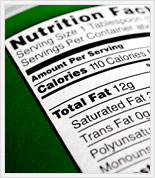 |
Already a member? Secure Login
|

- Ideal Weight Calculator
- Waist-to-Hip Ratio Calculator
- BMI Calculator
- Frame Size Calculator
- Target Heart Rate Calculator

- Good Fast Food
- Recipe Makeovers
- Meal Plans
- Nutrient Facts
- Food Label Claims
- Estimating Serving Sizes



Trans Fatty Acids
QUESTION:
I keep hearing that trans fats are bad for you. What are they and how can I avoid them?
I keep hearing that trans fats are bad for you. What are they and how can I avoid them?
ANSWER:
 Trans fatty acids (TFA's), also known as funny fats, are formed when oils are subjected to heat, pressure, chemical solvents, or a process called hydrogenation. This process of hydrogenation exposes an oil to high heat and high pressure in the presence of hydrogen gas. Functionally, it makes an unsaturated fat more solid at room temperature, which extends its shelf life and improves texture in many processed goods.
Trans fatty acids (TFA's), also known as funny fats, are formed when oils are subjected to heat, pressure, chemical solvents, or a process called hydrogenation. This process of hydrogenation exposes an oil to high heat and high pressure in the presence of hydrogen gas. Functionally, it makes an unsaturated fat more solid at room temperature, which extends its shelf life and improves texture in many processed goods. It was once thought that these fats were better than saturated fats because they were unsaturated. However, we now know that not only do trans fats increase LDL cholesterol (bad cholesterol) as saturated fats do, but they also decrease HDL cholesterol (good cholesterol) -- a double whammy! There is also increasing evidence that these funny fats may lead to a host of other problems as well, such as metabolic disorders.
Manufacturers have been using partially hydrogenated oils in products for decades now and they are in a large percentage of processed foods. Any product that lists partially hydrogenated oil on the ingredients list will contain trans fatty acids. Common foods that contain TFA's are:
- Commercial baked goods (cakes, cookies, doughnuts, etc)
- Fried Foods (French fries, fish sticks, fried chicken, etc.)
- Margarine and vegetable shortenings
- Chips and Crackers
A Warning about Food Labels
Since 2006, the Food and Drug Administration has required food manufacturers to list trans fat on the Nutrition Facts label. Unfortunately, if the food contains fewer that 0.5 grams per serving, the FDA allows manufacturers to say that the item contains zero trans fat. These small amounts that slip through the cracks can really add up! The only way to play it safe is to read the ingredients and exclude foods from your diet that contain hydrogenated oils. Better yet, choose minimally processed foods for the bulk of your diet (fresh fruits and vegetables, whole grains and cereals, beans and legumes, low-fat or fat-free dairy products, and nuts and seeds) and you can't go wrong!| Related Articles: |
 |
The author, Dr. Sharon E. Griffin, holds a B.S., M.S., and Ph.D. in the areas of exercise science/physiology. She also holds a second M.S. degree in Nutrition and is a licensed nutritionist and an ACSM certified health and fitness instructor.
© 2026 MyFoodDiary.com. All Rights Reserved.